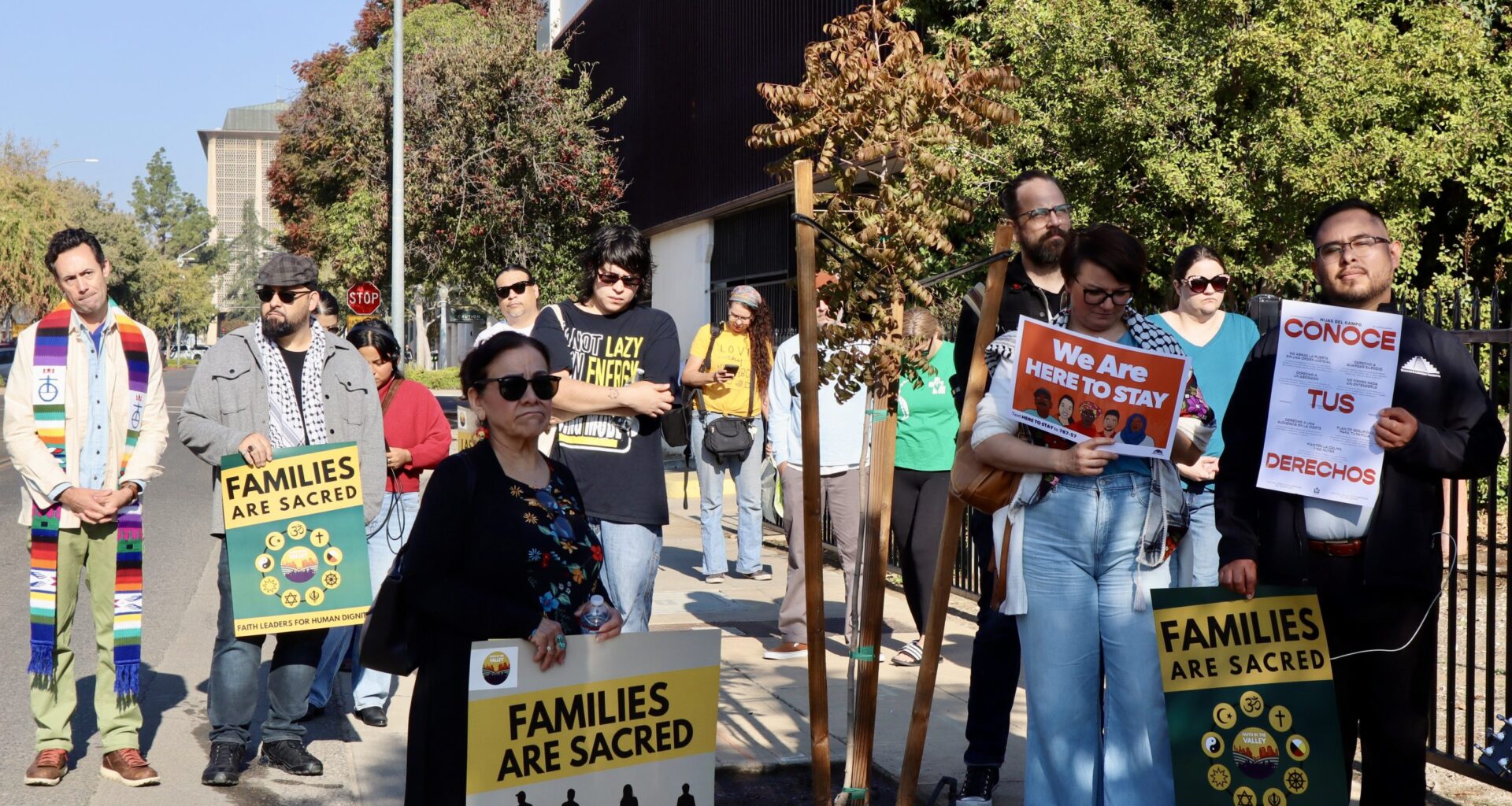What’s at stake:
Advocates and interfaith leaders gathered outside the Fresno ICE Processing Center to denounce racial profiling and detentions of immigrants attending required appointments with no criminal record.
On Tuesday morning, around 40 community members and faith leaders gathered outside the Fresno U.S Immigration and Customs Enforcement (ICE) Processing Center for public prayer and “moral witness” as local detentions continue to rise.
Faith in the Valley, along with clergy from Catholic, Protestant, Jewish, Muslim, Indigenous, and other traditions, also held a parallel interfaith vigil outside the Stockton ICE Processing Center simultaneously with the Fresno rally.
Some local interfaith leaders emphasized the challenges faced by immigrants and Indigenous communities in Fresno and the broader Central Valley, describing these struggles as “permanently intertwined and interlinked.”
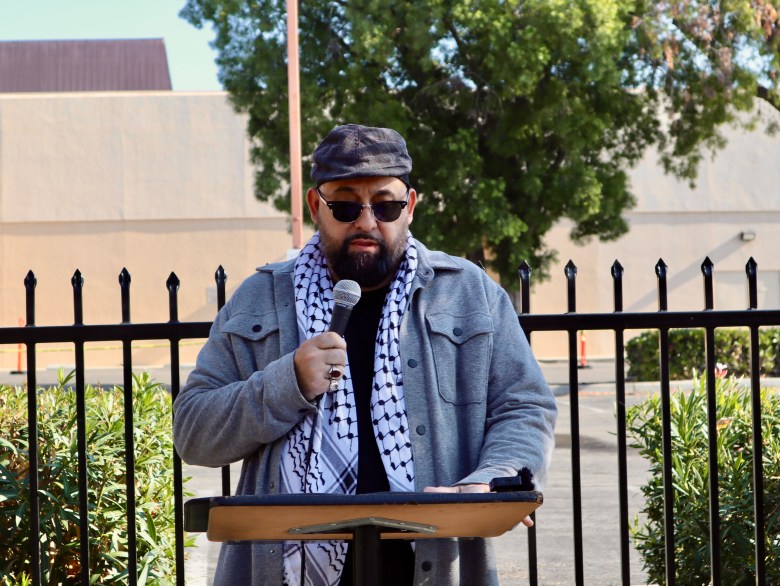 Hajj Reza Nekumanesh, executive director of the Islamic Cultural Center of Fresno, urged interfaith clergy to maintain “consistency, consistency, consistency” in advocating for human rights in all circumstances. Gisselle Medina | Fresnoland
Hajj Reza Nekumanesh, executive director of the Islamic Cultural Center of Fresno, urged interfaith clergy to maintain “consistency, consistency, consistency” in advocating for human rights in all circumstances. Gisselle Medina | Fresnoland
“We have to stand up against ICE and its unjust and inhumane treatment of our immigrant sisters and brothers,” Hajj Reza Nekumanesh, executive director of the Islamic Cultural Center of Fresno said. “And we have to stand up against the genocide of all indigenous peoples, and in particularly of the Palestinians, because all of these struggles, sisters and brothers, and all of our victories, are permanently intertwined and interlinked with one another.”
Faith leaders spoke out against ICE raids in Los Angeles, Chicago, New York, and numerous other communities, highlighting repeated violations of the Fourth Amendment’s protections against unreasonable searches and seizures.
The leaders condemned these detentions as civil rights violations, which affect both U.S. citizens and undocumented workers. They also raised concerns about racial-profiling, violent arrests, prolonged detentions without access to legal counsel, and deportations to third-party countries, such as South Sudan, where people face indefinite imprisonment, torture, and even death.
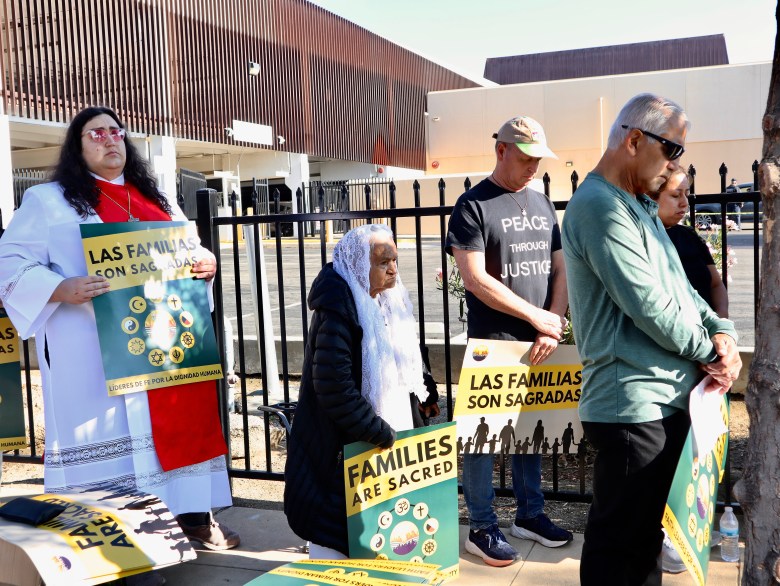 Interfaith leaders and community members in prayer during the vigil. Gisselle Medina | Fresnoland
Interfaith leaders and community members in prayer during the vigil. Gisselle Medina | Fresnoland
Fresnoland has previously reported that immigrants attending required appointments at the Fresno U.S. Citizenship and Immigration Services (USCIS) office, are being detained during or after their visits — despite having no criminal records and maintaining current paperwork.
Fresnoland also reported that immigrants attending required appointments related to their permanent residence status at the Fresno U.S. Citizenship and Immigration Services (USCIS) office were detained during or after their visits—despite having no criminal records and maintaining current paperwork.
Earlier, in June, two undocumented immigrants were taken into custody by Customs and Border Protection (CBP) agents during an ICE-led operation outside Fresno’s Intensive Supervision Appearance Program (ISAP) office, reflecting a practice seen in several states.
ICE arrests in California’s Central Valley have increased by 58% during the first seven months of President Donald Trump’s administration compared to the same period the previous year, according to The Fresno Bee.
At the vigil Tuesday, advocates raised concerns about California’s newest and largest detention center, a 2,560-bed facility that opened in late August in California City’s Antelope Valley. They cited reports of poor conditions, alleged mistreatment by staff, and the fact that CoreCivic has not yet received approval for its operating permits.
‘Racialized targeting’
Nekumanesh called on interfaith clergy to uphold “consistency, consistency, consistency” in defending immigrant rights, fighting police brutality, addressing the genocide in Palestine, and standing against other instances where human rights are being denied.
Other faith leaders, including Rev. Akiko Miyake-Stoner of the United Japanese Christian Church, drew on their personal histories to highlight the parallels between current immigration detentions in Fresno and the city’s past.
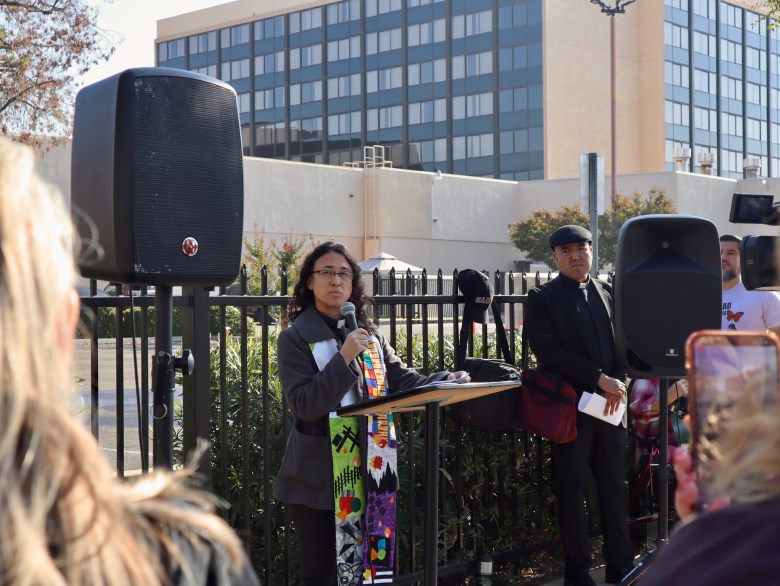 Rev. Akiko Miyake-Stoner of the United Japanese Christian Church, drew on their personal histories to highlight the parallels between current immigration detentions in Fresno and the city’s past. Gisselle Medina | Fresnoland
Rev. Akiko Miyake-Stoner of the United Japanese Christian Church, drew on their personal histories to highlight the parallels between current immigration detentions in Fresno and the city’s past. Gisselle Medina | Fresnoland
She noted that the Fresno Fairgrounds served as a temporary detention facility, the Fresno Assembly Center, from May to October 1942, where over 5,000 Japanese Americans, many from Central California, were held during World War II, describing the similarity as “eerily familiar.”
“One doesn’t have to look hard to see the parallels with today’s ICE raids done with such brutality and without due process,” Miyake-Stoner. “Both rely on racialized targeting that singles people out by appearance, language or national origin rather than individual guilt. Both depend on sweeping executive and bureaucratic power that suspends ordinary protections and normalizes detention. Both leave families separated, lives disrupted and communities carrying intergenerational trauma.”
Rev. Madeleine Guekguezian of the United Methodist Church of Merced, an Armenian Armenian American and descendant Armenian Genocide survivors, reflected on U.S. immigration policy, emphasizing that enforcement has often targeted people based on race rather than legal status.
She highlighted how undocumented immigrants are subjected to inhumane detention and removal from their communities, framing those who look different from the white-skinned Anglo majority in the U.S. as threats rather than as fellow human beings.
“The Catholicos of All Armenians Karekin II had once said, ‘justice is a gift from God, lack of justice is a sin against God.’ I carry that with me,” Guekguezian said. “For those standing in line for ICE processing, for check ins, my prayer is that justice and relief comes to you as soon as it may be through the action of the people and the repentance of our leaders, but it will not be soon enough.”
How to build a first line of defense
Nora Zaragoza-Yáñez, Faith in the Valley’s Watch Network program manager, said she struggles to speak to people who think it’s acceptable for families to be torn apart and denied due process. She emphasized that caring for neighbors should be a basic value learned from childhood.
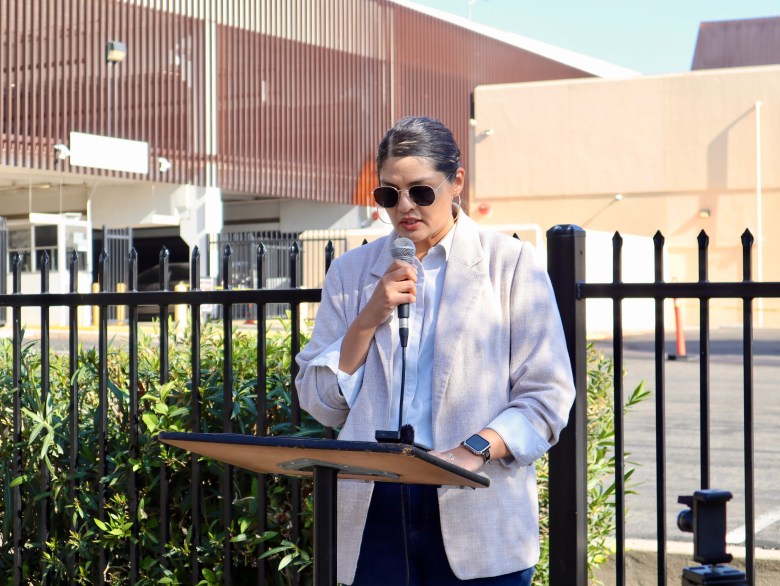 Nora Zaragoza-Yáñez, Faith in the Valley’s Watch Network program manager, shared that she struggles to speak to people who think it’s acceptable for families to be torn apart and denied due process. Gisselle Medina | Fresnoland
Nora Zaragoza-Yáñez, Faith in the Valley’s Watch Network program manager, shared that she struggles to speak to people who think it’s acceptable for families to be torn apart and denied due process. Gisselle Medina | Fresnoland
“They’re dragging people out of their homes, out of their cars and out from public spaces in front of their families because of where they were born, not because of whatever crap they made up or discovered after,” Zaragoza-Yáñez said. “Where’s the due process? No, really, where is the due process? This isn’t acceptable.”
Zaragoza-Yáñez explained that the Watch Network empowers the community by educating people about their rights, accompanying them to check-ins or court appearances, and preparing families for potential incidents. She described the program as the community’s first line of defense, operating across eight Central Valley counties to respond to the tactics used by ICE.
“We keep our community safe by adding our little grain of sand into the bigger picture,” Zaragoza-Yáñez said. “Our interfaith leaders who are present here today are doing just that, and they’ve been doing that. They have bared witness to the atrocities that are being committed against our communities, they’re standing strong against any dehumanization of them, and their efforts are the embodiment of what it means to accompany someone to bear witness to what’s happening.”
That sense of shared responsibility also resonated with local community members in attendance. Jackie Pierson shared with Fresnoland that, as a white person whose “Christian faith is tied to the most marginalized,” she strives to leverage her privilege by volunteering with watch networks and by listening to and walking alongside her neighbors.
While attending the No Kings protests, Sylvia Valdez, a community member invited by an interfaith leader from On Ramps Covenant Church, told Fresnoland that the narrative seems to be shifting, with more white people showing up in solidarity with the communities most directly affected by the actions of Trump’s administration.
Valdez said she wasn’t sure what to expect from the morning’s vigil but ultimately felt “unity, peace, and God doing something powerful” through the gathering.
“I was able to look inward and grieve what’s happening,” Valdez said. “I thought about the needs of the people.”
Related

